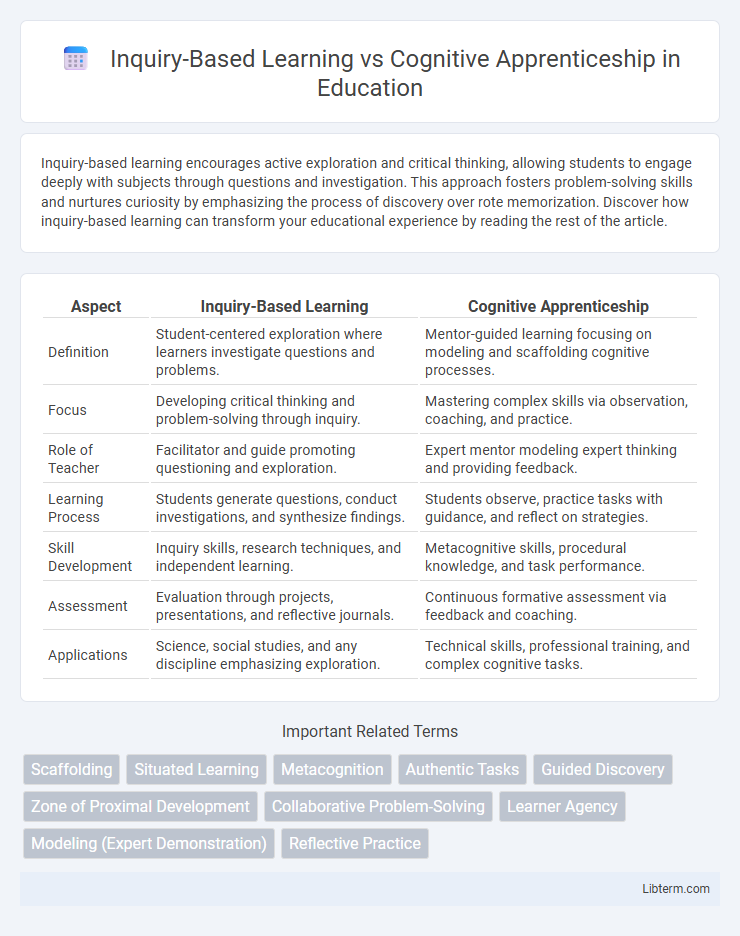Inquiry-based learning encourages active exploration and critical thinking, allowing students to engage deeply with subjects through questions and investigation. This approach fosters problem-solving skills and nurtures curiosity by emphasizing the process of discovery over rote memorization. Discover how inquiry-based learning can transform your educational experience by reading the rest of the article.
Table of Comparison
| Aspect | Inquiry-Based Learning | Cognitive Apprenticeship |
|---|---|---|
| Definition | Student-centered exploration where learners investigate questions and problems. | Mentor-guided learning focusing on modeling and scaffolding cognitive processes. |
| Focus | Developing critical thinking and problem-solving through inquiry. | Mastering complex skills via observation, coaching, and practice. |
| Role of Teacher | Facilitator and guide promoting questioning and exploration. | Expert mentor modeling expert thinking and providing feedback. |
| Learning Process | Students generate questions, conduct investigations, and synthesize findings. | Students observe, practice tasks with guidance, and reflect on strategies. |
| Skill Development | Inquiry skills, research techniques, and independent learning. | Metacognitive skills, procedural knowledge, and task performance. |
| Assessment | Evaluation through projects, presentations, and reflective journals. | Continuous formative assessment via feedback and coaching. |
| Applications | Science, social studies, and any discipline emphasizing exploration. | Technical skills, professional training, and complex cognitive tasks. |
Introduction to Inquiry-Based Learning and Cognitive Apprenticeship
Inquiry-Based Learning emphasizes active student exploration and questioning to construct knowledge through investigation and discovery. Cognitive Apprenticeship involves learning through guided experience, where experts model skills and thought processes, gradually transferring responsibility to learners. Both approaches foster deep understanding but differ in their methods of scaffolding and learner autonomy.
Core Principles of Inquiry-Based Learning
Inquiry-Based Learning centers on student-driven exploration where learners formulate questions, investigate problems, and construct knowledge through active discovery. Core principles include fostering curiosity, encouraging critical thinking, and promoting hands-on engagement with real-world scenarios to develop deeper understanding. This contrasts with Cognitive Apprenticeship, which emphasizes guided learning through modeling, coaching, and scaffolding by experts to acquire cognitive and metacognitive skills.
Key Elements of Cognitive Apprenticeship
Key elements of cognitive apprenticeship include modeling, coaching, scaffolding, articulation, reflection, and exploration, which together help learners internalize expert thinking processes. Unlike inquiry-based learning that emphasizes student-driven questioning and discovery, cognitive apprenticeship immerses students in authentic tasks guided by expert mentors who provide support until mastery is achieved. This approach fosters situated learning by making tacit knowledge explicit through collaborative practice and gradual transfer of responsibility.
Differences in Teaching Strategies
Inquiry-Based Learning emphasizes student-driven exploration where learners formulate questions and investigate solutions, fostering critical thinking and independent problem-solving. Cognitive Apprenticeship centers on expert modeling, guided practice, and scaffolding to make thinking processes visible, allowing students to acquire skills through observation and mentorship. The primary difference lies in Inquiry-Based Learning's focus on autonomous discovery versus Cognitive Apprenticeship's structured, mentor-led skill development.
Student Engagement and Motivation
Inquiry-Based Learning enhances student engagement by encouraging active exploration and fostering curiosity through open-ended questions and problem-solving tasks. Cognitive Apprenticeship motivates learners by embedding them in authentic contexts where expert guidance and social interaction support skill development and real-world application. Both methods increase motivation by promoting deeper understanding, but Inquiry-Based Learning emphasizes student autonomy while Cognitive Apprenticeship focuses on collaborative learning within expert-novice relationships.
Role of Teachers and Facilitators
Inquiry-Based Learning positions teachers primarily as facilitators who guide students through open-ended questioning and exploration, encouraging independent problem-solving and critical thinking. In Cognitive Apprenticeship, teachers serve as expert mentors who model cognitive and metacognitive strategies, engaging learners in authentic tasks while providing scaffolding and gradual release of responsibility. Both approaches emphasize active learner engagement but differ in teacher roles, with Inquiry-Based Learning focusing on fostering autonomy and Cognitive Apprenticeship prioritizing direct skill transfer through expert guidance.
Assessment Methods and Learning Outcomes
Inquiry-Based Learning utilizes formative assessments such as reflective journals and project-based tasks to gauge students' understanding and critical thinking skills, promoting self-directed learning and inquiry skills. Cognitive Apprenticeship employs observational assessments and performance evaluations within authentic tasks, emphasizing the development of expert problem-solving and metacognitive skills through guided practice. Both methods enhance higher-order thinking but differ as Inquiry-Based Learning fosters independent inquiry, while Cognitive Apprenticeship emphasizes social interaction and expert modeling for mastering complex skills.
Real-World Applications in Educational Settings
Inquiry-Based Learning emphasizes student-driven exploration of real-world problems to foster critical thinking and deeper understanding through active investigation. Cognitive Apprenticeship models learning by pairing students with experts in authentic contexts, allowing hands-on practice and reflection to develop domain-specific skills. Both approaches integrate real-world applications by promoting experiential learning, but Inquiry-Based Learning prioritizes student inquiry while Cognitive Apprenticeship focuses on guided skill acquisition through mentorship.
Benefits and Challenges of Each Approach
Inquiry-Based Learning fosters critical thinking and deep understanding by engaging students in exploring questions and constructing knowledge, which enhances motivation and retention but may pose challenges in classroom management and requires skilled facilitation. Cognitive Apprenticeship emphasizes learning through guided experience and social interaction, promoting practical skills and tacit knowledge acquisition, yet can be time-consuming and dependent on the expertise of the mentor. Both approaches support active learning but differ in structure and reliance on instructor involvement, impacting scalability and learner autonomy.
Choosing the Right Model for Your Classroom
Inquiry-Based Learning encourages student-driven exploration and fosters critical thinking by having learners pose questions and investigate solutions, ideal for classrooms emphasizing independence and curiosity. Cognitive Apprenticeship models emphasize guided learning through expert demonstration and scaffolding, benefiting students who thrive under structured support and real-world context integration. Selecting the appropriate model depends on the students' prior knowledge, classroom goals, and the balance between autonomy and guidance desired for optimal skill development.
Inquiry-Based Learning Infographic

 libterm.com
libterm.com